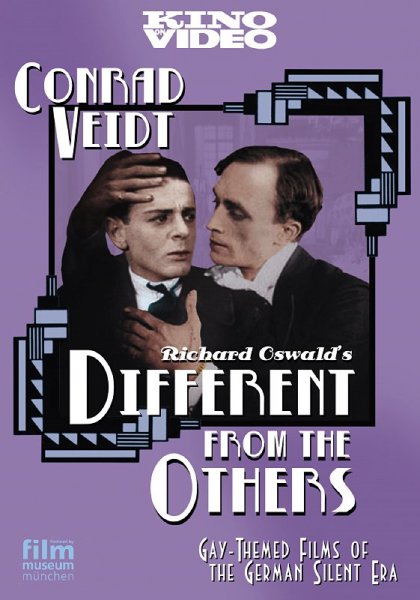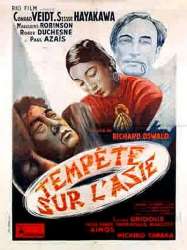Different from the Others is a Allemand film of genre Drama directed by Richard Oswald with Conrad Veidt
Different from the Others (1919)

If you like this film, let us know!
Different From The Others (German: Anders als die Andern) is a German film produced during the Weimar Republic. It was first released in 1919 and stars Conrad Veidt and Reinhold Schünzel.
The story for Anders als die Andern was co-written by Richard Oswald and Dr. Magnus Hirschfeld, who also had a small part in the film and partially funded the production through his Institute for Sexual Science, with the aim of presenting the story as a polemic against the then-current laws under Germany's Paragraph 175, which made homosexuality a criminal offense.
The cinematography was by Max Fassbender, who two years previously had worked on Das Bildnis des Dorian Gray, one of the earliest cinematic treatments of Oscar Wilde's The Picture of Dorian Gray. Director Richard Oswald later became a director of more mainstream films, as did his son Gerd. Veidt became a major film star the year after Anders was released, in The Cabinet of Dr. Caligari.
Anders als die Andern is one of the first sympathetic portrayals of homosexuals in the cinema. The film's basic plot was used again in the 1961 UK film, Victim, starring Dirk Bogarde. Censorship laws enacted in reaction to films like Anders als die Andern eventually restricted viewing of this movie to doctors and medical researchers, and prints of the film were among the many "decadent" works burned by the Nazis after they came to power in 1933.
Synopsis
Veidt portrays a successful violinist, Paul Körner, who falls in love with one of his male students. A sleazy extortionist threatens to expose Körner as a homosexual. Flashbacks show us how Körner became aware of his orientation and tried first to change it, then to understand it. Körner and the extortionist end up in court, where the judge is sympathetic to the violinist, but when the scandal becomes public, Körner's career is ruined and he is driven to suicide.Actors

Conrad Veidt
(Paul Körner)

Fritz Wendhausen

Anita Berber
(Else, Kurt's Sister)

Wilhelm Diegelmann
(Kurt's Father)

Clementine Plessner
(Kurt's Mother)
Comments
Leave comment :
Suggestions of similar film to Different from the Others
There are 83 films with the same actors, 52 films with the same director, 69528 with the same cinematographic genres (including 1037 with exactly the same 2 genres than Different from the Others), 7309 films with the same themes (including 2456 films with the same 4 themes than Different from the Others), to have finally 70 suggestions of similar films.If you liked Different from the Others, you will probably like those similar films :

Prostitution (1919)
, 2h1Directed by Richard Oswald
Origin German
Genres Drama
Themes Films about sexuality, Erotic films, Films about prostitution, Erotic thriller films
Actors Anita Berber, Gussy Holl, Conrad Veidt, Emil Lind, Werner Krauss, Wilhelm Diegelmann
Rating63%






Spring Awakening (1929)
Directed by Richard Oswald
Genres Drama
Themes Pregnancy films, Films about sexuality, Films about suicide, Films based on plays
Actors Paul Henckels, Mathilde Sussin, Rolf von Goth, Ita Rina, Valy Arnheim, Fritz Rasp
Rating18%






Es werde Licht! (1917)
Directed by Richard Oswald
Origin German
Genres Drama
Themes Films about sexuality
Actors Werner Krauss, Lupu Pick, Gertrude Welcker, Bernd Aldor, Max Gülstorff, Hugo Flink
Rating58%





Bien qu'il se base sur la fiction, les quatre films sont principalement conçus comme des films informatifs et éducatifs sur les maladies sexuellement transmissibles et d'autres conséquences de la vie de rapports sexuels non protégés.

Around the World in 80 Days (1919)
, 2h1Directed by Richard Oswald
Genres Drama, Comedy, Adventure, Romance
Themes Films based on science fiction novels
Actors Conrad Veidt, Anita Berber, Eugen Rex, Max Gülstorff, Paul Morgan
Rating64%





In order to win a bet, British gentleman Phileas Fogg attempts to circle the globe in eighty days, along with his French servant, Passepartout. Fogg is wrongly suspected of having robbed the Bank of England and faces the risk of arrest throughout his journey.

The Story of Dida Ibsen (1918)
Directed by Richard Oswald
Genres Drama
Actors Anita Berber, Conrad Veidt, Werner Krauss, Emil Lind, Clementine Plessner, Eugen Rex

Alraune (1930)
, 1h43Directed by Richard Oswald
Genres Science fiction, Horror
Themes Films about sexuality, Erotic films
Actors Brigitte Helm, Albert Bassermann, Adolf E. Licho, Agnes Straub, Bernhard Goetzke, Martin Kosleck
Rating61%






Carlos and Elisabeth (1924)
, 1h55Directed by Richard Oswald
Origin German
Genres Drama, Historical, Romance
Themes Théâtre, Films based on plays
Actors Conrad Veidt, Eugen Gottlob Klöpfer, Aud Egede-Nissen, William Dieterle, Adolf Klein, Robert Taube
Rating66%





Don Carlos, l'héritier du trône d'Espagne, aime Élisabeth de Valois, la femme promise à son père Philippe. Ce dernier tente d'empêcher cette union en faisant surveiller la jeune femme.

Figures of the Night (1920)
Directed by Richard Oswald
Genres Drama, Horror
Actors Paul Wegener, Erna Morena, Conrad Veidt, Erik Charell, Anita Berber, Paul Bildt
Rating55%






Tempête sur l'Asie (1938)
, 1h35Directed by Richard Oswald
Origin France
Genres Drama, Adventure
Actors Conrad Veidt, Sessue Hayakawa, Madeleine Robinson, Lucas Gridoux, Serge Grave, Paul Azaïs
Un aventurier tente de s'emparer de gisements de pétrole en Mongolie.

Lady Hamilton (1921)
Directed by Richard Oswald
Origin German
Genres Drama, Historical, Romance
Actors Liane Haid, Conrad Veidt, Werner Krauss, Anton Pointner, Julia Serda, Georg Alexander
Rating57%





Ce film raconte la liaison entre Lord Horatio Nelson et Emma Hamilton.
 Connection
Connection